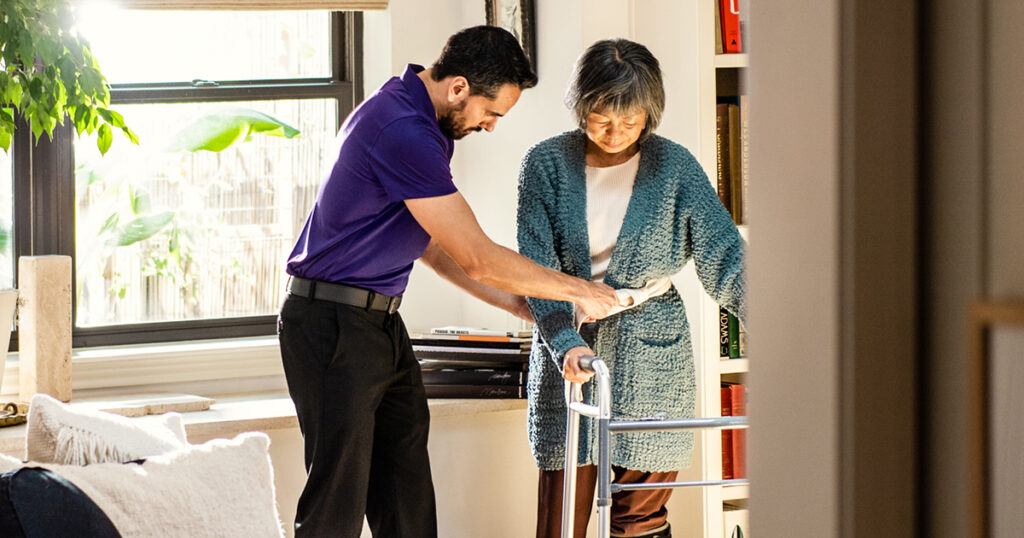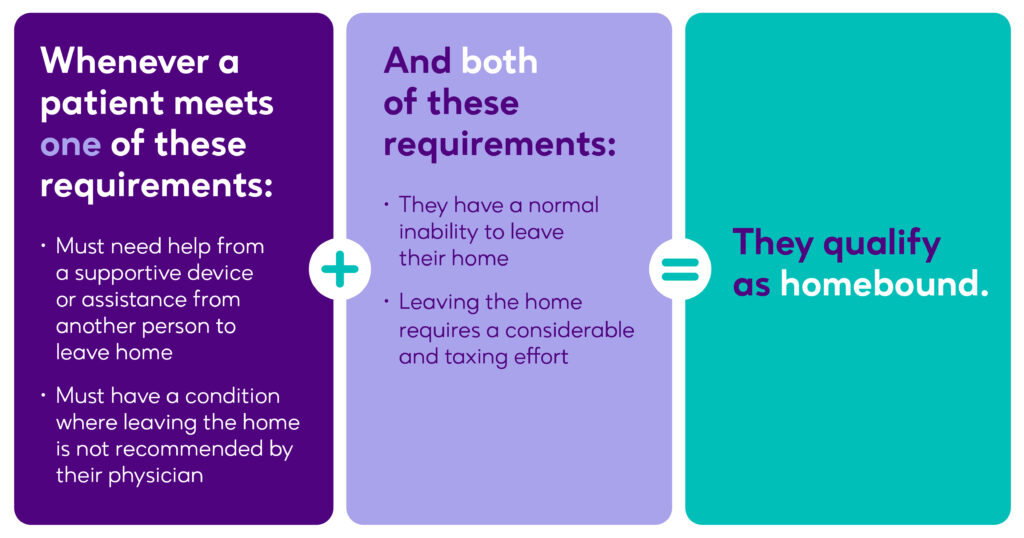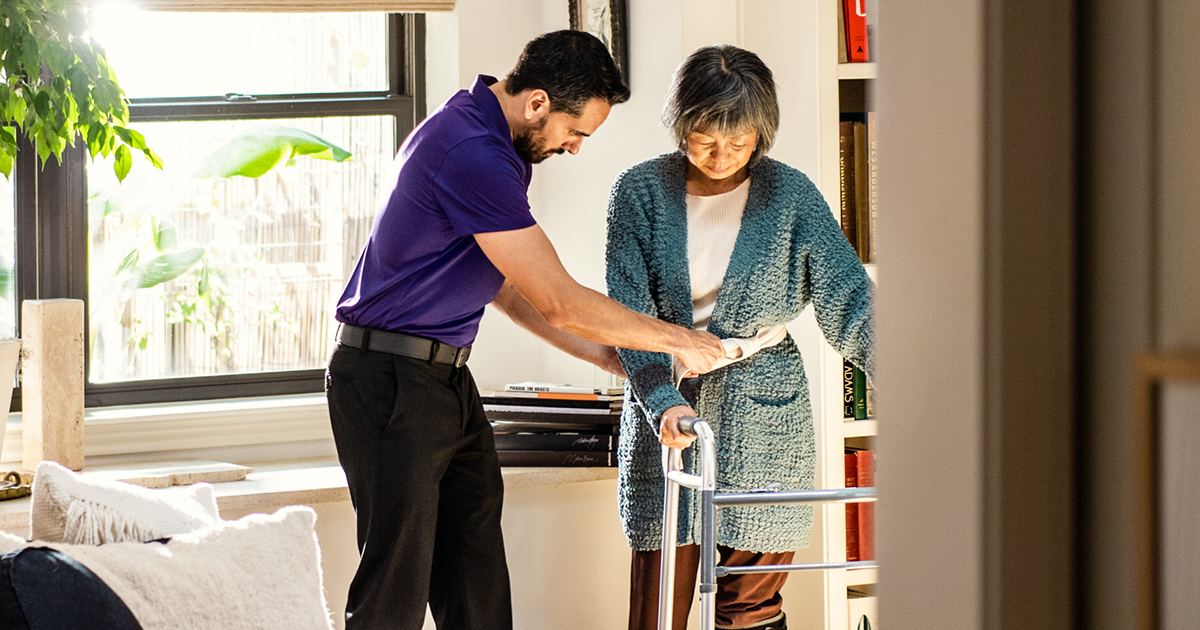If you’ve ever researched home health care, you may have heard the term “homebound.” While it may seem to have a common-sense definition, when it comes to home-based care, patients must meet specific criteria to be considered “homebound” for purposes of Medicare.

What is the definition of homebound?
Just because a patient spends a lot of time recovering at home doesn’t mean they necessarily qualify as homebound. To be eligible to receive Medicare home health benefits, a patient must qualify under this two-part test:
First, a patient must meet ONE of these two requirements:
- They must, because of their illness or injury, need help from a supportive device such as crutches, canes, wheelchairs, walkers, the use of special transportation or the assistance of another person in order to leave their home.
- They must have a condition where leaving the home is medically contraindicated, meaning a physician does not recommend it.
Second, a patient must meet BOTH of these requirements:
- They have a normal inability to leave their home.
- This means that they aren’t able to leave the home often, and when they do, it is only for short periods of time.
- They are permitted to leave the home for medical appointments, adult day care, religious services, trips to the barber, a short drive or a family function, etc. But if they can frequently leave their home for hours at a time, they would not qualify as homebound.
- Leaving home requires a considerable and taxing effort.
- This means that their condition must make leaving the home very difficult due to things like pain, shortness of breath, endurance, etc.
It is important for a patient to meet each set of qualifying circumstances. When a patient meets one of the first requirements and both of the second requirements, a physician can certify a patient as “homebound” for home health purposes.
To help better illustrate what qualifies a patient as homebound, please reference the graphic below.

Example: Would Mohammed be considered homebound?
Mohammed just had knee surgery and requires a walker to move around. Although the walker helps him get from one place to another, he has not recovered enough to travel far distances yet without pain. He can travel to the pharmacy to pick up his prescriptions but his pain and poor endurance after surgery prevents him from going anywhere else currently.
Because of his illness or injury, Mohammed needs help from a supportive device in order to leave his home, meeting the first homebound requirement. He also has a normal inability to leave his home; And when he does, it requires a considerable and taxing effort, meeting the second homebound requirement.
Mohammed meets all the qualifying criteria for homebound status, and his physician can certify him as homebound so he can start receiving home health services.
Do you have to be homebound to qualify for home health care?
Medicare only covers home health services if a patient has both a need for skilled care (such as nursing or therapy) and is certified as homebound by their physician.
A patient is not considered homebound if they have a normal ability to leave home, and do so often. If a non-homebound patient still needs skilled care, they can get care at an outpatient level. However, they would not qualify for home health care coverage under Medicare.
Example: Would Ellen be considered homebound?
Ellen had her appendix removed a few weeks ago. Although she still feels a bit tired from her procedure and is still relying on a cane to help her keep her balance, she spends each morning at her community senior center and volunteers at the local animal shelter three times a week.
Because of Ellen’s illness or injury, she needs help from a supportive device in order to leave her home, meeting the first homebound requirement. However, since she is able to move around her community and volunteer, she does not have a normal inability to leave her home and she can do so without a considerable and taxing effort. This means she doesn’t meet the second homebound requirement.
Ellen doesn’t meet all the qualifying criteria for homebound status. Therefore, she cannot receive Medicare-covered home health services.
Do you have to be homebound to qualify for hospice care?
Hospice care is different than home health care. It is reserved for people facing a life-limiting illness, and the qualifying circumstances differ, including Medicare coverage requirements.
Hospice Medicare coverage requirements don’t require a patient to be considered homebound. A homebound requirement is only required for Medicare home health services.
Hospice patients are encouraged to experience as much as possible and continue participating in the activities they love. These include attending church, visiting family and even traveling out of town.
How can I get started with home health services?
At Enhabit Home Health & Hospice, we provide comprehensive home health care that helps patients meet their specific goals, maintain independence and improve their quality of life. Our services include skilled nursing care, medical social work, home health aides and physical, occupational and speech therapy.
If you are a patient and think you may meet the qualifying criteria for homebound status, it may be time to talk to your doctor about beginning home health services. Reach out to Enhabit here if you have any additional questions about initiating home health or hospice care.
If you are a physician and have a patient who you think could benefit from home health care services, visit our health care providers page to learn more about referring a patient to our care.
 Back to Resource library
Back to Resource library
Browse top categories
Social Share
At Enhabit our patients are our number one priority. From providing the latest medical practices to building deep personal connections, we’re focused on upholding every patient’s dignity, humanity and sense of control on their health care journey.
Home health
Our home health services give patients access to the care they deserve in the comfort of their own homes. From disease and injury management to recovery from surgery, our clinicians help patients confidently achieve their health care goals.
Hospice care
Our hospice care services place importance on the comfort of every patient living with a terminal illness. Our caring professionals are dedicated to providing not just physical care, but spiritual and emotional support to every patient and their loved ones.






